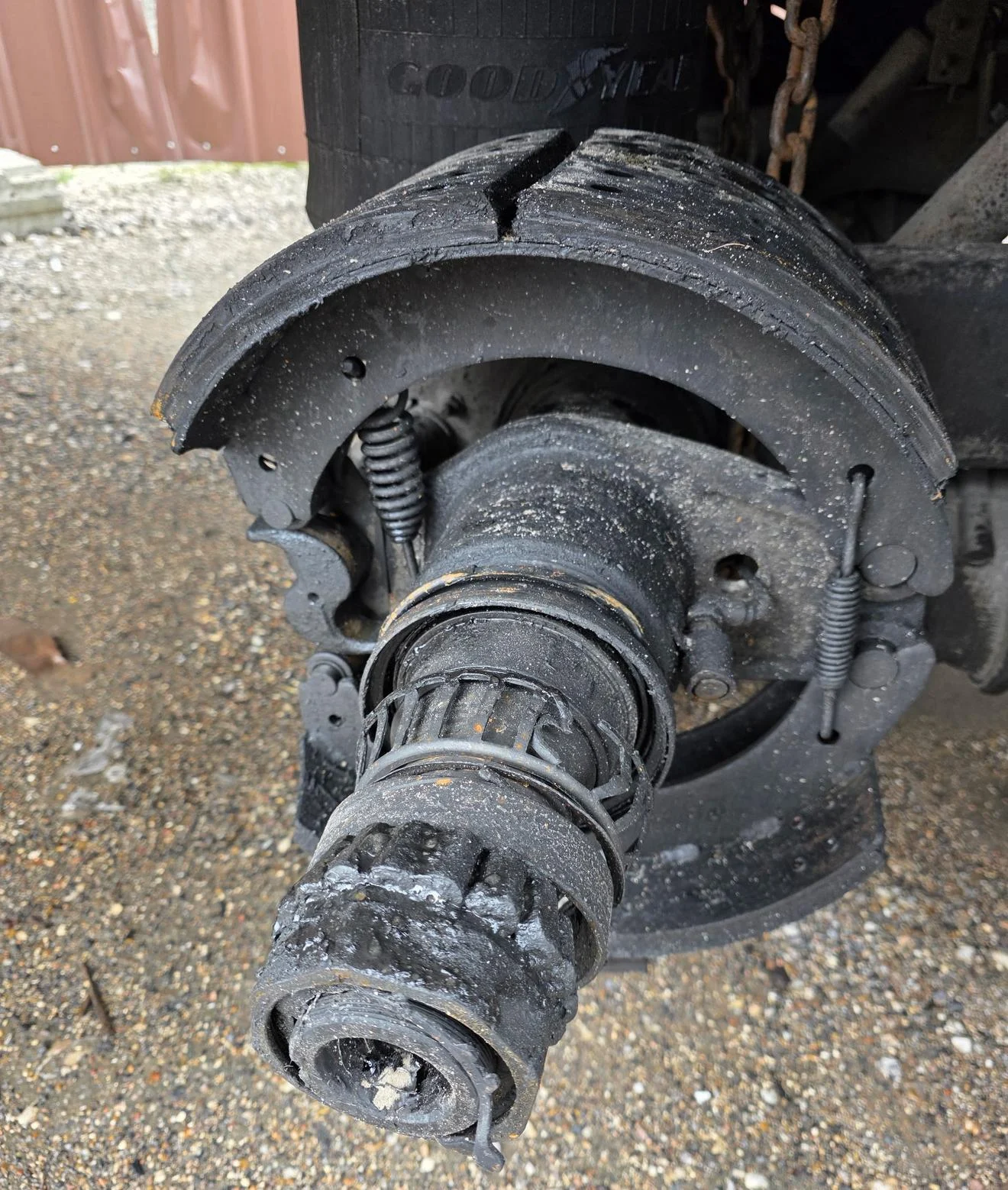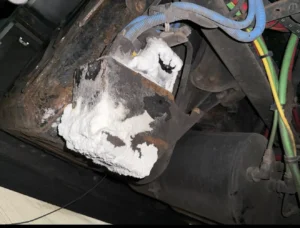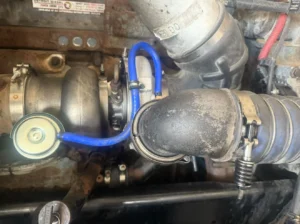
Preventive maintenance is more than just tightening bolts and checking fluids — it’s about protecting your equipment from catastrophic failure. One of the most overlooked yet critical components on any commercial truck or trailer is the hub assembly. More specifically, the hub oil that lubricates and protects your wheel bearings.
Neglecting this simple fluid check can lead to devastating results — from bearing failure to spindle replacement — costing time, money, and possibly safety on the road. In this post, we’ll break down what hub oil does, what happens when it’s ignored, and how you can avoid major repair bills with a simple preventive maintenance routine.
What is Hub Oil and Why is it Important?
Hub oil (sometimes referred to as gear oil or wheel bearing oil) is the lifeblood of your truck’s wheel end assembly. It plays a vital role in keeping the wheel bearings running smoothly and preventing expensive failures.
Hub oil is responsible for:
Lubricating the wheel bearings to prevent metal-on-metal contact.
Reducing heat and friction during long hauls.
Keeping contaminants like dirt and water out.
Ensuring smooth wheel rotation under heavy loads.
Without sufficient hub oil, the bearings overheat, grind down, and fail — causing damage that can extend to the hub, spindle, and even brake components.
The Cost of Neglecting Hub Oil
At Sam’s Roadside Service Towing and Recovery LLC, we recently worked on a truck where the hub oil level was never checked after a seal failure. The result was devastating:
Bearings overheated and disintegrated.
The hub spun dry directly on the spindle.
Extreme heat chewed into the spindle itself.
The only option was cutting off the damaged spindle and welding on a replacement.
👉 Instead of a quick hub service, the customer faced a major downtime event, a costly repair, and lost revenue from a truck being sidelined.
This is why trailer suspension repair, semi-trailer hub inspections, and preventive truck maintenance are non-negotiable in the trucking industry.
Signs of Hub Oil Problems You Shouldn’t Ignore
If you’re a fleet manager, truck owner, or operator, these are the early symptoms of hub oil failure to watch out for:
Oil or grease leaking from the hub cap or backing plate.
Hub feels excessively hot after driving (too hot to touch).
Grinding or vibration noises from the wheel area.
Wobbling or looseness when checking the hub during inspection.
Hub oil appears contaminated (milky, gritty, or burnt smell).
These are all red flags that your hub seals, bearings, or lubrication system need attention immediately.
Roadside Support You Can Count On
No matter the situation, our reliable roadside assistance ensures you get the help you need, fast. From breakdowns to emergencies, we’re here 24/7 to keep you moving.
Hub Oil Maintenance Best Practices
The good news? Most hub oil problems are completely preventable with the right maintenance routine.
Here’s what we recommend at Sam’s Services:
Check Hub Oil Levels Regularly – Include it in every pre-trip inspection. Low oil levels almost always indicate a seal leak.
Inspect Wheel Seals During PM Services – A failing seal will cause leaks that drain hub oil levels quickly.
Change Oil on Schedule – Just like engine oil, hub oil needs to be drained and replaced before it becomes contaminated.
Use Sight Glass Hub Caps – This makes it easy to visually monitor hub oil levels and condition.
Inspect Bearings During Brake Service – Any time the hub is apart, bearings and lubrication should be inspected.
👉 Pairing hub oil maintenance with other services like Trailer Repair or Wheel Alignments ensures your equipment stays road-ready.
Hub Oil Failure vs. Other Common Truck Repairs
Many truckers and fleet operators don’t realize that hub oil neglect often leads to additional repair needs, such as:
Brake Drum and Shoe Damage – From overheated hubs.
Spindle Replacement – One of the most expensive outcomes of bearing failure.
Towing and Recovery – If the hub locks up on the highway, roadside service becomes unavoidable.
That’s why many fleets include hub oil checks in the same preventive schedule as Emergency Truck Repair and Roadside Assistance.
Why Fleets Should Prioritize Hub Oil Maintenance
For fleet operators, downtime equals money lost. A single truck sidelined with a failed hub can mean thousands in repair bills plus lost revenue from a missed load.
By training drivers to:
Perform quick hub oil inspections during walkarounds,
Report leaks or unusual wheel noises immediately,
And schedule regular shop PM services,
…fleets can drastically cut costs and avoid major failures.
At Sam’s Services, we also help fleets design preventive schedules that cover hub oil checks, clutch replacement, suspension inspections, and towing recovery to reduce emergency breakdowns.
Final Thoughts
This particular failure — a destroyed hub and spindle — was 100% preventable. All it would have taken was a top-off and seal replacement at the first sign of leakage. Instead, the truck faced major downtime and a costly spindle replacement.
At Sam’s Roadside Service Towing and Recovery LLC, we’ve seen it all — from broken leaf spring trailers to hub oil failures. That’s why we stress preventive maintenance as much as possible.
If you’re noticing leaks, overheated hubs, or unusual noises, don’t wait until you’re stuck on the roadside. Call us today for hub oil service, trailer suspension repair, and emergency truck repair that keeps you moving safely and affordably.
Frequently Asked Questions
Hub oil is a lubricant that protects the wheel bearings inside a truck or trailer hub assembly. It prevents metal-on-metal contact, reduces heat and friction, and ensures smooth wheel rotation. Without hub oil, bearings can fail and cause costly damage to the hub and spindle.
Hub oil levels should be checked during every pre-trip inspection and as part of your scheduled preventive maintenance program. Using hub caps with sight glasses makes it easier to monitor fluid levels quickly.
Common signs of hub oil issues include oil leaking from the hub cap, overheated hubs, grinding noises from the wheel area, and contaminated oil that looks milky or burnt. If you notice these symptoms, immediate inspection is recommended.
Yes. If hub oil levels drop too low due to a failed seal or lack of inspection, the wheel bearings can overheat and seize. This can cause the hub to spin dry on the spindle, leading to severe damage that often requires cutting and replacing the spindle.
At Sam’s Roadside Service Towing and Recovery LLC, we provide complete hub oil service, trailer suspension repair, and emergency truck repair to keep your equipment safe and road-ready. Contact us for preventive maintenance or roadside service when you need it.



